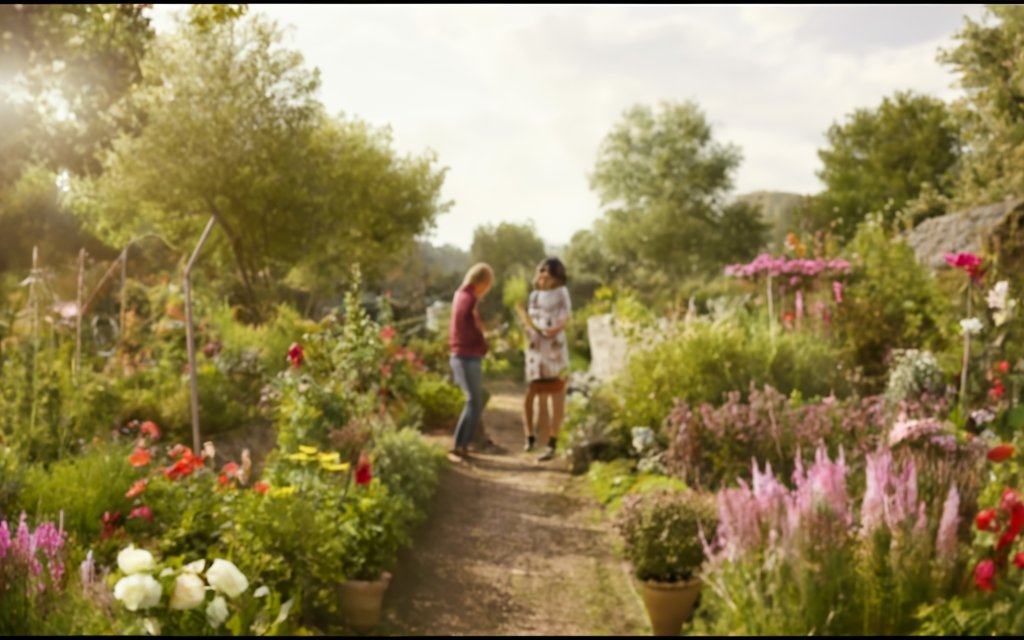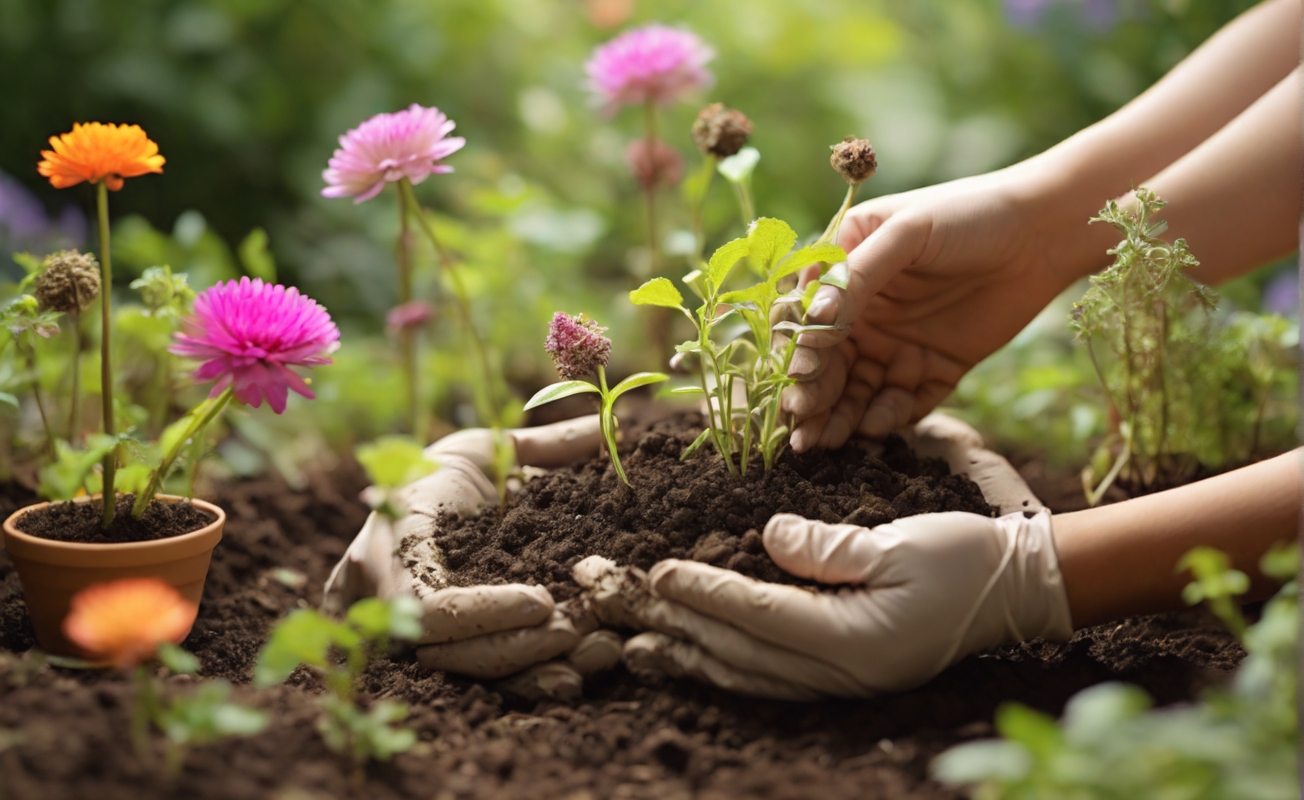Gardening as a Therapeutic Practice: How Planting Seeds Can Foster Healing and Well-Being
Have you ever wandered through a garden and experienced an immediate sense of calm and relief? Spending time in nature is known to have profound mental health benefits, and manmade gardens are no exception. Whether it’s a rose garden, an herb garden, or a vegetable garden, each can evoke feelings of peace and wonder and bring about a grounding energy.
While simply strolling through a garden can be therapeutic, creating and tending to your own garden takes the experience to a whole new level. Gardening is not just meditative; it’s also a healing practice with a host of benefits for mental well-being.
The Benefits of Gardening for Mental Health Gardening offers a beautiful way to bring grounding energy into our homes. Whether you have the opportunity to sow seeds in an outdoor garden bed or create a small garden on your kitchen windowsill, the act of planting seeds and nurturing plants can have a profoundly positive impact on your mental health.
Aniko Dunn, a licensed Psy.D. at EZ Care Clinic, which specializes in treating stress, anxiety, depression, PTSD, and other mental health-related concerns, emphasizes the healing properties of gardens. “Research strongly suggests that spending time in a green environment can reduce stress and boost confidence,” Dunn states. Gardening can significantly contribute to building and enhancing confidence.
According to Naomi Robinson, the founder of Houseplant Authority, “Working on your plants shows your confidence in your ability to help them grow, which, in turn, allows you to focus on future outcomes.” This focus on the future and the confidence it generates can instill a genuine sense of optimism, especially when other aspects of life may seem less promising.
Gardening can have a range of impactful benefits on mental health, including:
- Developing Patience: Gardening activities often require considerable patience, from watching seeds sprout to awaiting the harvest. This can help nurture your ability to be patient.
- Reducing Stress: Spending time in the garden and engaging in activities like watering plants, cleaning the garden, and tending to the soil can protect against and alleviate stress, according to Dunn.
- Increasing Self-Esteem: Successfully cultivating a garden can boost your self-esteem, as it reflects your ability to nurture and grow your own food.
- Improving Mood: Surrounding yourself with plants and nature, such as in a garden, can provide a calming environment that uplifts your mood, as noted by Licensed Clinical Mental Health Counselor Juan Santos.
- Releasing Emotional Pain: Gardening provides a therapeutic space for self-care, and the act of tending to plants can be a form of emotional release, according to Santos.
What We Can Learn From Planting Seeds As Naomi Robinson aptly puts it, “No one plants seeds with the expectation of enjoying the outcomes tomorrow.” Gardening is a long-term commitment that requires time, care, and sometimes trial and error. This aspect of gardening offers valuable lessons for life. It teaches us to work on something in the present with the hope of reaping the rewards in the months or even years to come.
This mindset can have a positive impact on various aspects of life, especially if you struggle with anxiety or negative thoughts about the future. Planting seeds, both literally and figuratively, and nurturing them as they grow teaches us the value of patience and delayed gratification.
Grounding in the Garden If you’re eager to experience the healing benefits of planting seeds and gardening, Robinson recommends taking the first step by visiting a local gardening center. Talk to the experts there about which plants thrive in your local area. This can help you avoid starting with plants that are too finicky and difficult to care for.
For gardening beginners, Robinson suggests seeking information on plants that are relatively easy to care for, with herbs being an excellent starting point. Adding homegrown herbs to your dishes not only enhances their flavor but also exemplifies the concept of putting in effort now for long-term benefits. Gardening is not just about cultivating plants; it’s about nurturing your well-being and finding solace in the process.
The act of grounding in the garden and nurturing plant life goes beyond just the physical benefits; it touches the soul. Here are a few additional considerations as you embark on your journey of healing and well-being through gardening:

- Connection to Nature: Gardening fosters a deep connection to the natural world. As you watch your plants grow and flourish, you become attuned to the rhythm of life, from the changing seasons to the cycles of growth and decay. This connection can instill a sense of harmony and oneness with nature, which can be profoundly therapeutic.
- Mindfulness and Presence: Gardens provide an ideal setting for practicing mindfulness. While tending to your garden, you immerse yourself in the present moment. You become acutely aware of the sights, sounds, and sensations of the natural world. This mindfulness can help quiet a restless mind and reduce anxiety.
- Creativity and Expression: Gardening is a creative outlet where you can express your personality and style. The design of your garden, the choice of plants, and how you arrange them are all ways to express your unique vision. This creative process can be a source of immense satisfaction and self-expression.
- Community and Connection: Gardening can also be a communal activity. Joining a gardening club or participating in community garden projects can provide opportunities to connect with like-minded individuals. The shared experience of tending to the earth can foster a sense of belonging and support, which is invaluable for mental well-being.
- Physical Exercise: Gardening requires physical effort, from digging and planting to weeding and harvesting. Engaging in these activities provides a form of low-impact exercise, contributing to better physical health, which, in turn, can positively influence mental well-being.
As you start your gardening journey, remember that it’s not just about the end result, but the entire process. The act of planting a seed, nurturing it as it grows, and reaping the benefits of your efforts can be a metaphor for life itself. It reminds us that good things often take time and patience. This knowledge can be carried over into various aspects of your life, allowing you to approach challenges with a sense of resilience and optimism.
So, whether you have a spacious outdoor garden, a small balcony, or a cozy windowsill, consider planting some seeds and embarking on a journey of healing and self-discovery. In the garden, you may find not only flourishing plants but also a flourishing sense of well-being, optimism, and connection to the natural world.
Conclusion:

In conclusion, the act of planting seeds and nurturing a garden can be a transformative experience that extends far beyond the mere act of gardening. It is a practice that promotes healing, mindfulness, and well-being. The benefits of gardening for mental health are well-documented and include increased confidence, reduced stress, improved mood, and enhanced self-esteem. The garden is a place where patience is cultivated, and the rewards of delayed gratification are reaped.
Moreover, it teaches us to appreciate the beauty and wonder of the natural world and to be present in the moment, a valuable skill in our fast-paced, modern lives. Gardening can be a source of creativity, connection with nature, and community involvement. It’s a form of physical exercise that contributes to both physical and mental health. In sum, the garden is a sanctuary for nurturing not only plants but also the human spirit.
FAQ (Frequently Asked Questions):
- I live in a small apartment with no outdoor space. Can I still enjoy the benefits of gardening? Absolutely! Even with limited space, you can create a thriving indoor garden with potted plants, herbs, or succulents. Window sills, balconies, and hanging gardens are all great options for apartment dwellers.
- How do I get started with gardening if I’m a complete beginner? Starting small is key. Begin with easy-to-care-for plants like herbs, succulents, or houseplants. Do some research or consult with local gardening experts to learn about the specific needs of the plants you choose.
- I don’t have a green thumb. What if I end up killing my plants? Gardening is a learning process. Don’t be discouraged by setbacks. It’s perfectly normal to encounter challenges and occasional failures. Each experience in gardening, even those where plants don’t thrive, offers valuable lessons for improvement.
- Are there any specific plants that are particularly therapeutic for mental health? While the benefits of gardening can be derived from various plants, some studies suggest that lavender, rosemary, and sunflowers may have particular mood-enhancing qualities. However, the most therapeutic plants are often those that you have a personal connection with.
- Can gardening be practiced as a form of therapy or in a group setting? Yes, gardening therapy is a recognized form of horticultural therapy and is often used to promote mental health and well-being. Many community gardens and therapy programs offer group gardening sessions as a means of therapeutic support.
- How can I ensure my garden remains sustainable and environmentally friendly? Sustainable gardening practices include using organic soil and fertilizers, conserving water, and choosing native plants that are well-suited to your region. These practices not only benefit your garden but also contribute to a healthier planet.
In summary, gardening is a holistic practice that encompasses physical, mental, and emotional well-being. It allows you to connect with the natural world, cultivate patience, and foster a sense of optimism and confidence. Regardless of the size of your space or your gardening experience, you can embark on this journey of healing and self-discovery, reaping the countless rewards that gardening has to offer.







